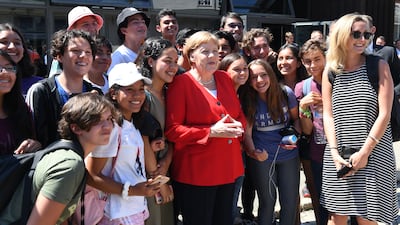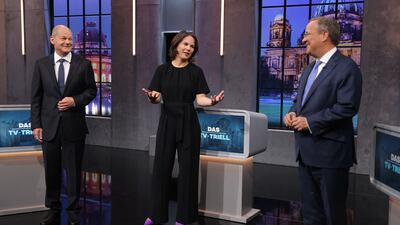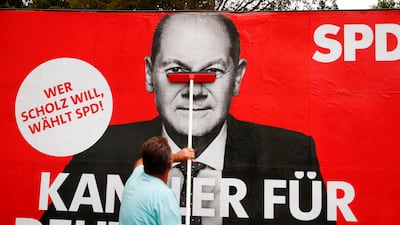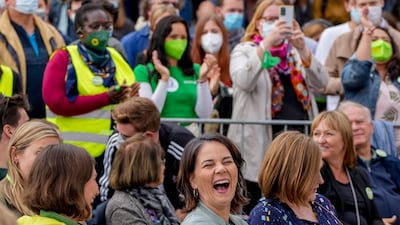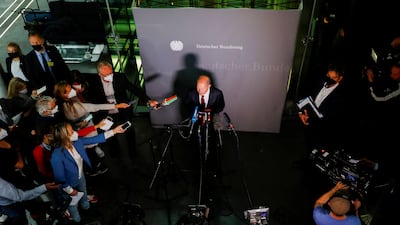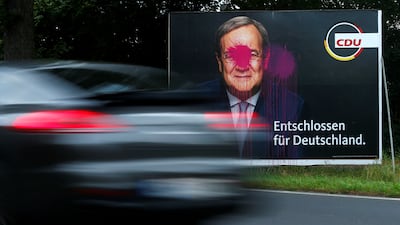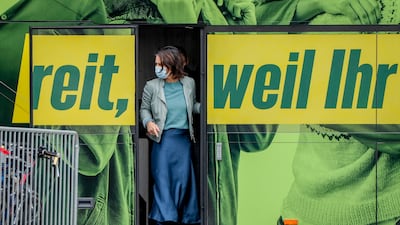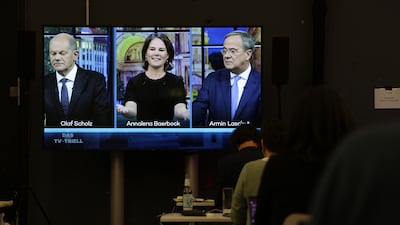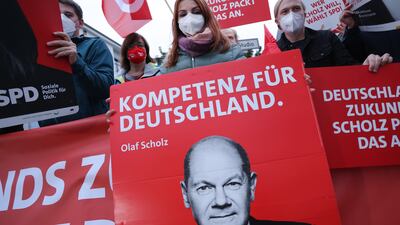In the view of Ramona Ruf, the race to succeed Angela Merkel is missing a voice – the votes of those who have lived their whole lives under Germany’s long-serving chancellor.
Ms Ruf, 27, is eligible to vote in next Sunday’s election but feels for the “Generation Merkel” youngsters who are not old enough to cast a ballot.
With young people yearning for a voice, she helped to run a mock election for schoolchildren on Friday in which more than 200,000 votes were cast across Germany. Scrawled on ballot boxes was the message: “You have a voice – let it out”.
“The youth elections show that young people can and want to vote, and they are clearly signalling that by taking part,” said Ms Ruf, from Bremen.
“Of course, what would be even better than this indirect form of political participation would be if young people were really included in the general election.”
Early results showed the Greens winning the youth ballot, reflecting young people’s concerns about the future of the planet they will inherit.
The party even took first place in Hamburg, the former stamping ground of Social Democrat nominee and election front-runner Olaf Scholz. It is also the birthplace of Mrs Merkel.
“We can’t wait for other people to make the decisions,” said Hamburg resident Frederic Artus, 23, who became interested in politics after travelling to Namibia and witnessing the lingering effects of German colonial rule.
“I have the feeling that two, three years ago my generation wasn’t so political, but that’s changed. Big topics like climate and sustainability have changed that.”
Viktoria Priewe, who is too young to vote at 16, believes that climate issues should not be the preserve of the Greens.
All the potential governing parties agree on the need to tackle climate change, but differ on how this can be achieved.
“All the parties have to be the parties of climate protection,” Ms Priewe said. She likened it to supporting fundamental values such as democracy.
One of the participants in the youth elections, 15-year-old Julia, said the elections showed how young people could vote differently to adults.
“It shows that young people are interested in politics too and want to take part," she said. “There’s something different about deciding which party to cast your votes for, compared to just saying which one represents my position the best."
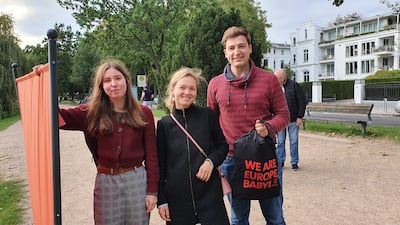
In power for 16 years, Mrs Merkel is the only chancellor that many Germans have known. Even those who turn 18 in time for the election will barely remember her predecessor, Gerhard Schroeder.
Lukas Kylau, who is from Luebeck near Hamburg and works for a youth organisation that encourages activism among young people, said the voices of the younger generation were critical to German democracy.
“Participation by children and young people is the heart of the matter for us,” he said.
“A broad social cohesion and solidarity are only possible when young people are involved and can shape things themselves. That is what we need for a democratic future.”
Helen Bannister, 29, is supporting the SPD, which she regards as the most serious party. She says some young people back the party because of a lack of attractive alternatives.
Political transparency is important to her and she argues that members of parliament should not be allowed second incomes from outside politics.
Mrs Merkel’s Christian Democrats were badly damaged in March by a scandal involving politicians making money from the coronavirus pandemic.
“I don’t see how someone who has such an important job could have time to work on other topics,” said Ms Bannister.
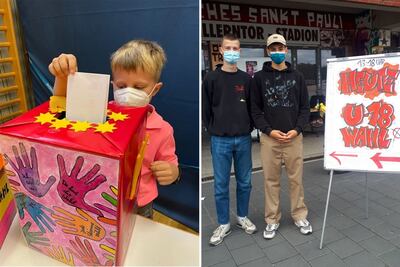
Across the generations in Germany, the signs are that Mrs Merkel’s popularity is failing to rub off on her party’s new leader Armin Laschet.
On a recent classroom visit, Mr Laschet was told he was not the politician that the schoolchildren really wanted to see.
“We are all really big fans of someone – that’s Angela Merkel,” one pupil said. “Could you call her for us?” He fobbed them off by calling Health Minister Jens Spahn instead.
One recent poll suggested Mr Laschet would win only 9 per cent of the vote among under-30s in a hypothetical direct race for the chancellorship. His rivals, Mr Scholz and Green nominee Annalena Baerbock, were both more popular.
The pro-business Free Democrats have also appealed to youth. Like the Greens, they want the voting age reduced to 16. The left-wing Linke party wants to go even further, to 14.
“Young people want a new political start,” said Stephan Schumann, 33, a candidate for the SPD and a leading member of the party’s youth wing.
“I can understand it. When you look at the debates of the last few years, it’s not like we’ve had an apolitical youth. Fridays for Future is the most recent example of that.
“Many young people have taken to the streets, not just on subjects that affect them directly, but that they find politically important – but haven’t really been reflected in the government’s actions in the last few years.”

Fridays for Future activists want younger members of Generation Merkel to harangue their elder relatives into backing the environmentalist cause.
“We need grandma and granddad in order to save the climate,” said one young activist. “Next time, instead of asking them for more pocket money, ask them if they will lend you their vote and cast it for your future.”
The far-right Alternative for Germany (AfD) also hopes for a slice of young people's votes. “The best reason to vote for the AfD: to annoy your left-wing teachers,” said one candidate, 32-year-old Matthias Helferich. He touted the proposed abolition of TV licence fees as a sweetener for Netflix-watching youngsters.
Mr Laschet’s Christian Democrats (CDU), while promising stability, are acknowledging a mood of change by promising a “decade of modernisation” for Germany.
Tilman Kuban, the 34-year-old head of the CDU’s youth wing, is running in Hannover under the slogan: “Time for young heads”. He refers to his modernising vision for the party as “trainers conservatism”.
In his pitch to young people, he talks about helping them become homeowners and land jobs in 21st-century industries. “We need new ideas, new heads, that can bring something a little different,” he says.
Some young people may not vote at all. About a third of under-30s did not cast a ballot at the last election, making them the least-represented group.
"I know enough people who think that all of this doesn't affect them," said Rufus, one of the young people who manned polling stations in Hamburg. "The earlier you start, the better."
Lower turnout "is a problem that needs to be taken seriously”, said Mr Schumann. He said the SPD had 80 candidates aged 35 or younger, and used social media heavily to reach young voters.
The widespread online campaigning has led to concerns about disinformation. Facebook says young people are exposed to double the amount of fake news as they were two years ago.
The social media company has set up a texting service which allows people to contact fact-checkers when they read a surprising claim.
Mrs Merkel, who has largely stayed out of the fray, appealed to young people to guard Germany’s democracy in an unusually candid discussion at a theatre in Duesseldorf last week.
“The rule of law is based on a high level of acceptance in the population,” she said. “Every generation has to fight for it anew.”
